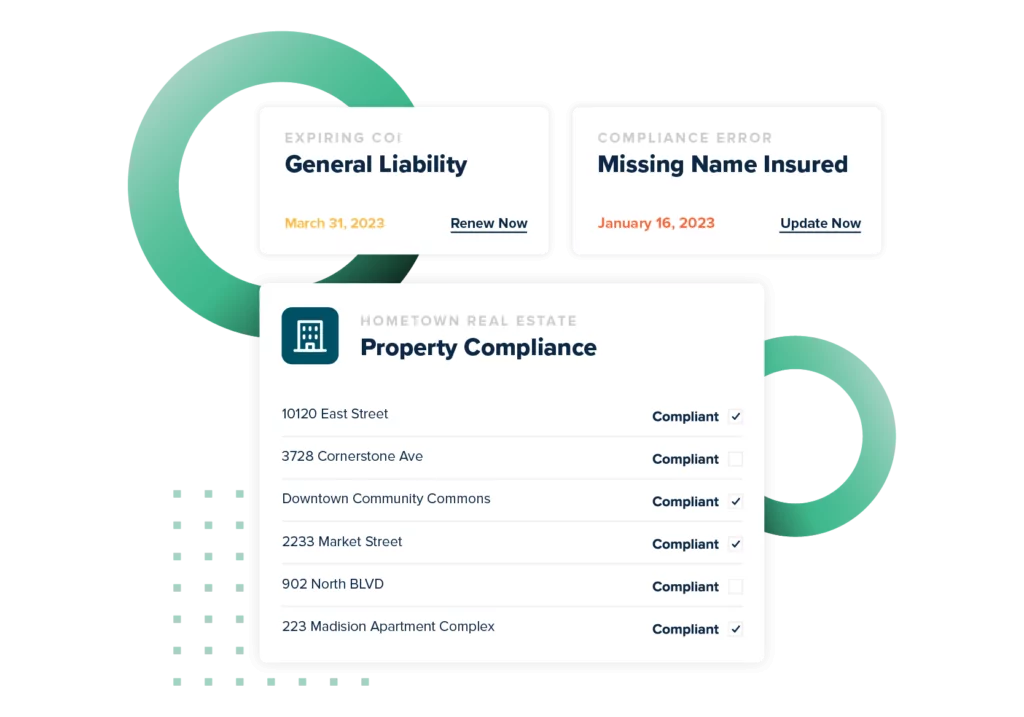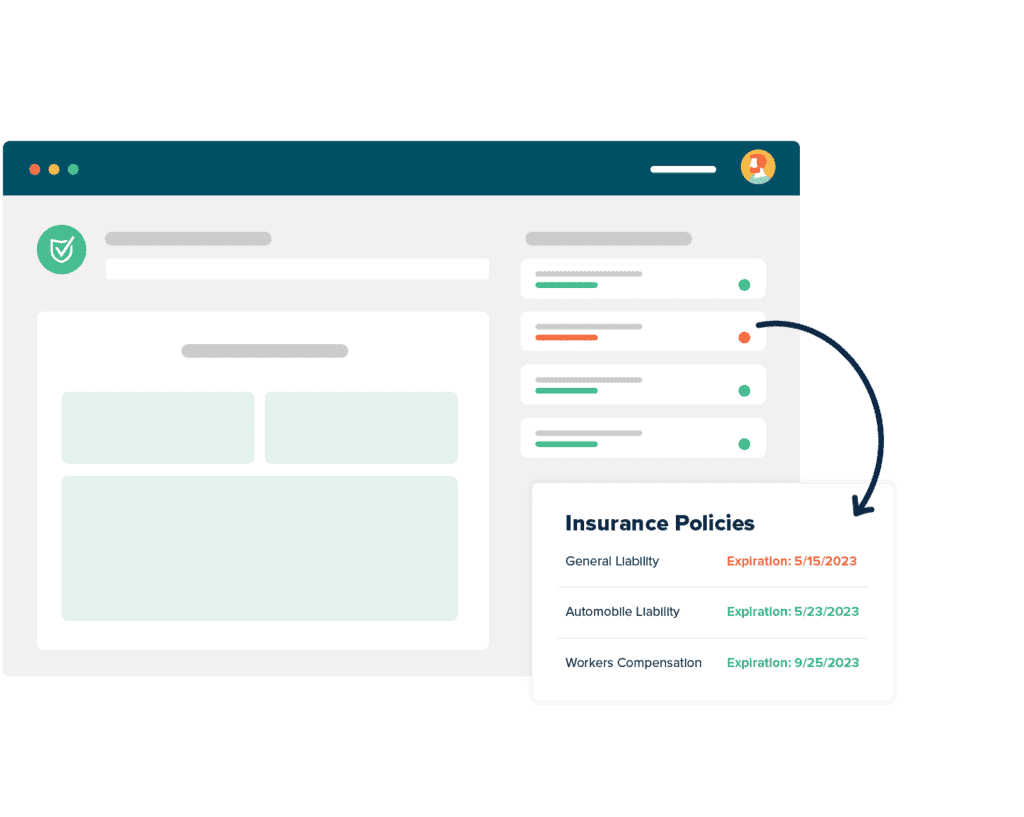Best Certificate of Insurance Tracking Software

Protect Your Business From Costly Claims
Ask your CFO or Risk Manager just how much claims and lawsuits can cost your business. If you are collecting certificates just to confirm they were received, you have no guarantee that your requirements are being met. myCOI Central is built on a foundation of insurance industry logic to ensure you remain protected with the appropriate coverage.
Automate Your COI Tracking
There’s no more need to worry about stacks of certificates cluttering up your office or hours of frustrating phone calls and emails to chase down certificates. myCOI Central provides your company with a solution to automate your insurance certificate requests, collection, and compliance resolution, while also giving your team a single, centralized repository to view compliance.


For Agents & Brokers
Win business and boost retention by providing agency branded, industry leading insurance tracking software to your insureds. Offer software only or add on your own compliance review services.
What Are The Benefits of COI Software?
View all CasesWhat Is A Certificate Of Liability Insurance
A certificate of liability insurance is a document you or your subcontractor provide to others that confirms and specifies the liability insurance you carry for your business, or that your business carries on your behalf. In many cases it is a document required by a business that seeks to hire you to perform services, or if you lease space for your business
At myCOI we sometimes hear people ask “what is a certificate of liability insurance,” too, so if you have to ask, don’t feel bad. It’s not a common document unless you need it. But when it is needed, it’s critical.
In construction or commercial real estate, time is precious. Projects have timelines, leases have end dates, and whether it’s a crew sitting idle, a building with no roof, or an empty commercial rental space, neither you nor your other stakeholders can afford to wait too long on paperwork. That’s one of the reasons certificates of insurance best practices often include keeping a copy of certificate of insurance documents within easy reach.
myCOI offers the industry-leading certificate of insurance tracking solution, in a self-service SaaS solution as well as a concierge, managed service solution. We pioneered the COI tracking industry, you might say. And our team of insurance specialists, coupled with our commitment to customer service, makes us unmatched.
Tracking certificate of liablity insurance forms can quickly get out of hand. We hear it over and over again from our clients. “We just weren’t successful in collecting and maintaining tenant insurance certificates,” one senior property manager told us. “Things were slipping through the cracks, and expensive claims they should have been protected against were coming in.”
It’s not just the number of certificates of insurance that gets away from business, though that is sometimes a factor. Each of those certificates needs to be verified, tracked and monitored to ensure that the third party stays in compliance.
Certificate Of Insurance
The concept of a certificate of insurance is not a new one. In a very basic form, you probably have a certificate of your auto insurance in your car or your wallet. The form is a bit more complex for business general liability insurance, but the concept is the same: a document issued by an insurer saying that the bearer is insured against certain actions to certain levels of protection. The most common certificate of insurance sample form is the ACORD 25.
Most agents or brokers will give you a certificate automatically, or offer you a way to request your certificate of insurance online via their website.
Now that we’ve talked about how important certificates of insurance are, let’s look at an example of what one looks like. By far the most common general liability form is the ACORD 25 general liability insurance form.
All of the fields are clearly labeled, and your agent or broker should provide it to you already filled out, but let’s look at the high points. The Insured box should have your name or your company’s name in it since it’s certifying your insurance. Depending on your coverage, you may see values in the General Liability box, the Automobile Liability box, or the Umbrella/Excess Liability box, and so on.
Knowing how to get insurance certificate online is only useful if you’re carrying the correct kind and amount of coverage for your situation. Knowing what is correct is a conversation you have with your hiring entity and your agent or broker.
Which Vendors Need A Certificate Of Insurance
If you’re a contractor or business asking which vendors need a certificate of insurance, the answer is pretty simple: any vendor that enters your business premises and takes any actions that may generate any risk at all needs to give you a certificate of insurance.
That sounds pretty vague, we know, but it’s a simple reality. Risk exists all around us, whether we generate it or not, and the last thing you want to do is assume the burden of risk your vendor opened you to because you failed to secure a certificate of insurance.
Now you may ask “what is a certificate of insurance for vendors?” and the answer is, the same thing you provide to other entities that you do work on behalf of. It should show the vendor’s coverage, any limitations or exclusions, and all the usual information.
Knowing how to request a certificate of insurance from a vendor likely comes down to how your business works with vendors. In many cases, COIs with the required coverages are required as part of the vendor application process or were specified in the RFP, or in an agreement or contract. If not, it’s often a requirement before the vendor can begin working.
If you deal with a lot of vendors, you can often save a lot of time by having a sample letter requesting certificate of insurance from vendors on hand.
Certificate Of Insurance For Small Business
The needs for a certificate of insurance for small business operators are the same as any other business. If your small business is hiring contractors, you will want to collect a certificate of insurance for contractors you hire. Any contractor who will be working in or around your business premises should be providing you with proof that they carry the coverage you demand of them to ensure you’re not assuming liability for risk that they cause.
Sometimes small business owners consider not securing certificates of insurance because they’re concerned about costs, but this isn’t a valid concern. Any certificate of insurance cost is borne by the insured, but that cost should be zero. There have been some cases of insurers requiring fees to replace certificates of insurance, but almost every agent or broker will provide these at no cost.
On the other end of the spectrum, if you’re a small business owner wondering how you gain certificates of insurance for your own small business insurance, the process is the same. Speak to your agent or broker or see if you can request the necessary certificates online from their website.
Certificates Of Insurance 101
Let’s take a moment and run through certificates of insurance 101. In its most simple form, a certificate of insurance is the evidence from your insurer that you carry the insurance you claim to carry. The normal forms include all the necessary information a requestor would need to verify that you or your business carry the insurance they require of their contracted entities. Just like your driver’s license says your state believes you know how to drive safely, so a certificate of insurance says your agent or broker believes you are covered.
There are nuances, of course. The certificate of insurance for businesses may be different, and will almost certainly carry different information, than the certificate of insurance for contractors, because the work done, the number of employees involved, and therefore the risk involved can be different.
A certificate of insurance also removes the need for unnecessary conversations. If you’re being considered for a job, competing on the bid is enough work. Not having to explain your insurance coverage, because your certificate of insurance explained it for you, can be a real time saver.
Remember too that insurance requirements vary by state, which means that certificate of insurance requirements by state vary also. Knowing when to request a certificate of insurance or, if you’re on the receiving end, how to check certificate of insurance can often be the difference between risk being managed and risk being out of control.
Certificate Of Insurance For Business
One of the most common issues we hear about around a certificate of insurance for business is either evidence of, or worry about, fake business insurance certificates. Erasing this fear is one of our core missions at myCOI and one we fight every day on behalf of our clients with our certificate verification programs.
Like any document, a certificate of insurance can be forged. In most cases, the forgery is obvious: handwritten rather than printed, sometimes in inks of different colors, different font types, or an obvious cut-and-paste photocopy. Any of these should be triggers for your compliance team to reach out to the producer or agent and confirm the coverage presented on the suspect certificate.
Any certificate, even certificates of insurance for subcontractors who have previously done work for you, should be reviewed first for accuracy in coverage, but also verified with the producer or agent to ensure the coverage presented is still accurate.
Certificates Of Insurance Issues And Answers
We know this can be a complicated topic because we get asked about certificate of insurance issues and answers all the time. Insurance is a complicated field with nuances around every corner, and almost every situation has some kind of unique aspect. Understanding coverage, understanding what the certificates of insurance actually say—and what they don’t say—can be, and often is, a full-time job, and it often takes more than glancing at a certificate of insurance template.
There are two parties you want to check within almost any instance of questions around certificates of insurance. First, for questions like which vendors need a certificate of insurance, check with your company’s risk management department, or when that doesn’t exist, your company’s general counsel about what your vendor insurance requirements are. In many cases, these departments or people can give you a certificate of insurance review checklist to help you ensure that the COIs you review have all the necessary coverage.
The other party will be the agent or broker who issued the certificate of insurance. When you have questions about the coverage, exclusions, or limitations shown on a certificate of insurance you receive, the only safe source of information is the agent or broker itself. Don’t ask the third party who provided you with the certificate; not only does this give them the opportunity to be dishonest, it also sets you up to be taken advantage of out of ignorance or a mistaken belief about coverage. Go to the source. Ask the agent or broker. Certificate of insurance compliance is complicated enough without adding more chances for mistakes.